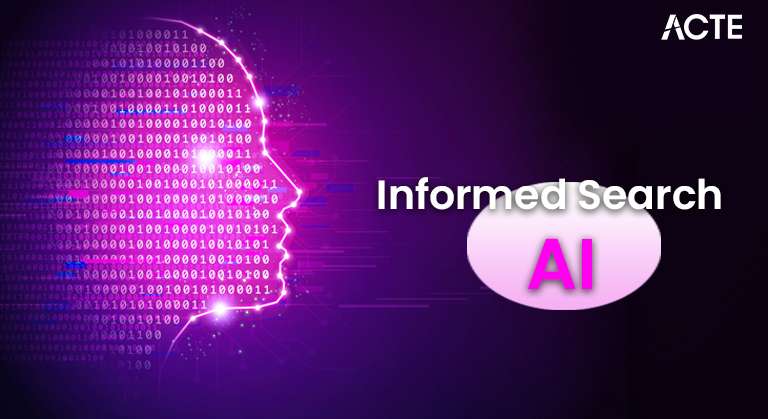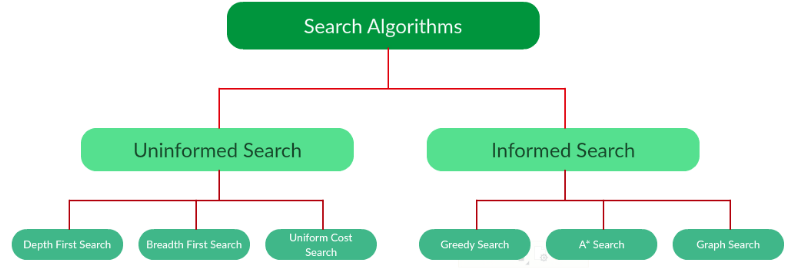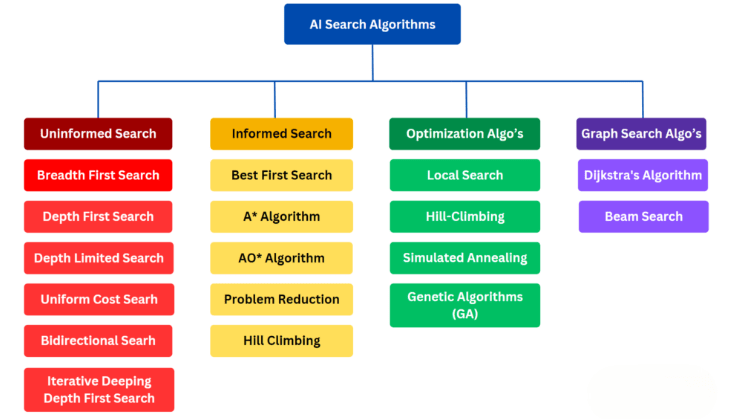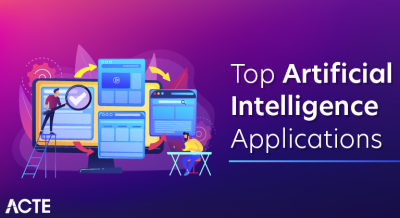
- Introduction to Search in AI
- Definition of Informed Search
- Heuristic Functions in AI Search
- Advantages and Disadvantages of Informed Search
- Applications of Informed Search in AI
- Challenges in Implementing Informed Search
- Future of Search Algorithms in AI
- Conclusion
Introduction to Search in AI
Search in AI refers to systematically exploring a space of possible solutions to find a solution or optimal outcome for a given problem. Search in Artificial Intelligence algorithms are crucial for various problem-solving tasks, such as navigating mazes, playing games, or solving complex optimization problems. These algorithms aim to efficiently explore the search space, which can often be vast and complex, to identify the most suitable or optimal solution. In AI, the search space comprises all possible states or configurations that could be reached during problem-solving, and Data Science Training provides the skills necessary to analyze and navigate this space effectively for optimal solutions. The search process involves moving through this space, often starting from an initial state and exploring different paths until the desired solution is found. Search algorithms, such as Depth-First Search (DFS), Breadth-First Search (BFS), A* search, and more, use different strategies to navigate this space. The key challenge in AI search is to do so efficiently, mainly when the search space is ample, to avoid excessive computation time. Optimizations such as heuristics, pruning, and different traversal strategies can help AI systems identify the best solution without exhaustively checking every possibility.
Are You Interested in Learning More About Data Science? Sign Up For Our Data Science Course Training Today!
Definition of Informed Search
Informed search, also known as heuristic search, is a search algorithm that uses additional knowledge or information about the problem domain to guide the search process more efficiently toward the goal. Unlike uninformed search, which explores all possibilities blindly, informed search leverages a heuristic function, a strategy that estimates the cost or distance from the current state to the goal. The purpose of informed search is to reduce the search space by prioritizing the exploration of states that are more likely to lead to the goal, and understanding Time Complexity for Data Structures is crucial for optimizing these search algorithms and improving their efficiency. The heuristic function provides a “hint” about promising paths, allowing the algorithm to focus on these paths rather than exhaustively searching through all possible options.

For example, in pathfinding problems like navigating a maze, a heuristic might estimate the straight-line distance from the current position to the goal, guiding the algorithm to choose the most promising directions. Popular informed search algorithms include A* (A-star) and Greedy Best-First Search, which use heuristics to find optimal or near-optimal solutions efficiently. The key advantage of informed search is its ability to dramatically reduce the number of states explored, leading to faster solution times, especially in large problem spaces, while still finding a solution close to the optimal one.
Heuristic Functions in AI Search
- Definition: A heuristic function is a method used to estimate the cost or distance from a given state to the goal state in a search problem.
- Purpose: Heuristics guide search algorithms, helping them make smarter decisions about which path to explore next, improving efficiency over uninformed search methods.
- Admissibility: A heuristic is admissible if it never overestimates the true cost to reach the goal. Admissible heuristics are essential for optimality in algorithms like A*.
- Informed Search: Heuristic functions are used in informed search algorithms, such as A*, Greedy Best-First Search, and Hill Climbing, and understanding Is Coding Required for Data Science can help you grasp how coding skills are essential for implementing and optimizing these algorithms effectively.
- Performance Boost: Good heuristics significantly reduce the number of nodes explored, speeding up the search process and conserving computational resources.
- Domain-Specific: Heuristics are often tailored to specific problems or domains, such as Manhattan Distance for grid-based pathfinding.
- Accuracy vs. Efficiency: There’s a trade-off more accurate heuristics often require more computation, while simpler ones are faster but less precise.
- Heuristic Design: Creating effective heuristics involves domain knowledge, abstraction, and sometimes machine learning to predict good estimates.
- Optimality: When using the right heuristics, algorithms like A* guarantee finding the best solution.
- Flexibility: Heuristics can be tailored to specific problem domains, improving search efficiency.
- Efficiency: Informed search algorithms can significantly reduce the number of nodes that need to be explored compared to uninformed search, and Data Science Training equips individuals with the techniques to apply these algorithms effectively for optimized problem-solving.
- Scalability: Heuristic functions help search algorithms handle larger and more complex problem spaces by focusing the search on the most promising paths, making them more scalable than exhaustive methods.
- Heuristic Dependence: The performance of an informed search algorithm heavily depends on the quality of the heuristic function.
- Memory Usage: Some informed search algorithms, especially A*, can require much memory as they store nodes and their associated costs.
- Complexity of Heuristic Design: Designing effective heuristics can be difficult and requires domain-specific knowledge.
- Risk of Suboptimal Solutions: If the heuristic is not admissible or consistent, the algorithm may find a solution faster but risk missing the optimal one, leading to suboptimal results.
- Designing Effective Heuristics: In some domains, creating a heuristic that is both computationally cheap and effective in guiding the search is challenging.
- Scalability: For large search spaces, even informed search algorithms can become computationally expensive, requiring significant memory and processing power.
- Real-Time Constraints: In dynamic or real-time environments, search algorithms may need to work within tight time limits, but Machine Learning Algorithms can help improve decision-making efficiency by learning from data and adapting in real-time.
- Inaccurate Heuristics: If the heuristic is poorly designed or not closely aligned with the actual cost, it can mislead the search process, causing unnecessary exploration and reduced efficiency.
- Domain Dependency: Heuristics are often highly specific to the problem domain. A heuristic that works well in one scenario may be ineffective or even detrimental in another, limiting the reusability and generalization of informed search algorithms.
- Machine Learning-Based Heuristics: Heuristics could be learned from data rather than manually designed, allowing for more flexible and domain-adapted search strategies.
- Parallel and Distributed Search: Leveraging modern computing architectures to perform search in parallel, speeding up the process and handling larger search spaces.
- Anytime Algorithms: Algorithms that can quickly find a suitable solution and improve it incrementally over valuable time in real-time systems highlight Why is Data Science Important, as it provides the analytical tools and techniques to optimize decision-making and performance in dynamic environments.
- Heuristic Optimization: Techniques like genetic algorithms, simulated annealing, or reinforcement learning can be used to automatically optimize or fine-tune heuristics for better performance in specific tasks.
- Hybrid Approaches: Combining informed search algorithms with other AI techniques such as constraint satisfaction, probabilistic reasoning, or deep learning can enhance the search process and handle more complex problems effectively.
- Explainable Heuristics: As AI systems become more integrated into critical decision-making processes, there is growing interest in designing heuristics that are interpretable and explainable, helping users understand and trust the reasoning behind search decisions.
Obtain Your Data Science Certificate? View The Data Science Course Training Offered By ACTE Right Now!
Advantages and Disadvantages of Informed Search
Advantages

Disadvantages
Applications of Informed Search in AI
Informed search algorithms play a crucial role in many Artificial Intelligence (AI) applications by providing efficient solutions to complex problems. One of the most prominent applications is in robotics, where these algorithms are used for pathfinding, allowing robots to navigate through environments filled with obstacles while choosing the most efficient route. In the realm of game AI, informed search is fundamental for developing intelligent strategies in games like chess, checkers, or Go, where the algorithm must evaluate millions of possible moves to determine the most advantageous play. Route planning is another significant area where informed search algorithms shine, and learning to Master Excel Formulas for Smarter Data Analysis can complement these algorithms by enabling efficient data organization and analysis for better route optimization. GPS navigation systems rely on these algorithms to calculate the shortest or fastest route between two locations by analyzing various factors such as distance, traffic conditions, and road types. Furthermore, informed search techniques are essential in solving optimization problems, such as scheduling tasks, allocating limited resources efficiently, or addressing the traveling salesperson problem, where the goal is to find the shortest possible route that visits a set of locations once. By incorporating heuristics and domain-specific knowledge, informed search algorithms enhance decision-making and problem-solving across diverse AI-driven systems and industries.
Want to Pursue a Data Science Master’s Degree? Enroll For Data Science Masters Course Today!
Challenges in Implementing Informed Search
Future of Search Algorithms in AI
The future of search algorithms in AI lies in improving efficiency, scalability, and adaptability. New approaches could include:
Want to Learn About Data Science? Explore Our Data Science Interview Questions & Answer Featuring the Most Frequently Asked Questions in Job Interviews.
Conclusion
Informed search algorithms, driven by heuristics, are essential tools in artificial intelligence for solving complex problems efficiently. These algorithms utilize additional knowledge, often a heuristic function, to guide the search process, enabling them first to explore the most promising paths. This reduces the search space and speeds up problem-solving compared to uninformed methods, which blindly explore all possibilities. Two prominent informed search algorithms are A* and Greedy Best-First Search. A* is optimal and complete, balancing the path cost and heuristic estimate to ensure the shortest path is found, and Data Science Training helps learners understand how to implement and optimize these algorithms for real-world applications. It combines the actual cost from the start to the current state and an estimate of the cost to the goal. On the other hand, Greedy Best-First Search prioritizes paths that appear to lead most directly to the goal, relying solely on the heuristic function. Despite their advantages, these algorithms face challenges such as designing effective heuristics and scaling the approach for large, complex search spaces. As AI research progresses, advancements in heuristic design and search algorithms continue to improve the efficiency and adaptability of these methods, enhancing their applicability in fields like robotics, optimization, and game-playing.




